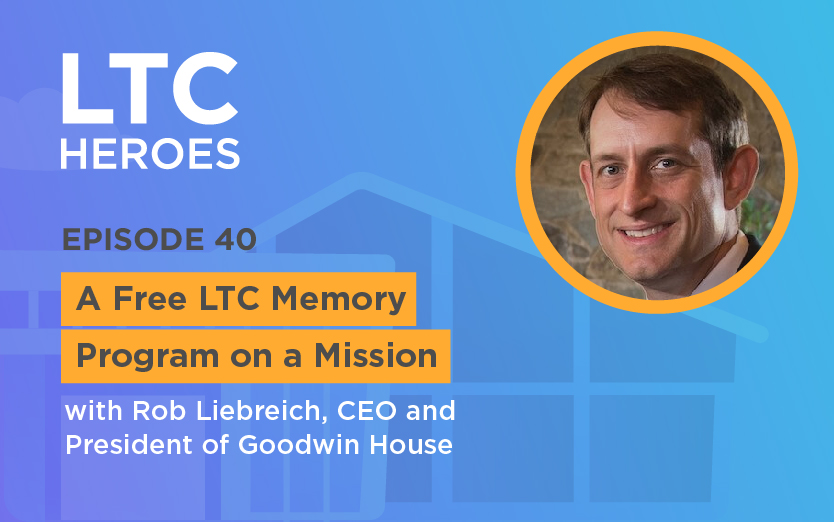In this week’s episode of the LTC Heroes podcast, we sit down with Rob Liebreich, CEO and President of Goodwin House, to discuss the StrongerMemory program he established.
Rob Liebreich was chosen as President and CEO of Goodwin House Incorporated in May 2019. His energy, compassion, and creative drive, as well as his steady leadership in senior living, made him stand out during a competitive six-month national search for the new Goodwin House CEO.
StrongerMemory is a program designed to stimulate the brain’s prefrontal cortex, which is responsible for our ability to retrieve memories. Users spend 20 to 30 minutes a day practicing reading, writing, and math activities.
Rob began the program when he began witnessing his mother’s struggles with mild cognitive impairment.
At the beginning of the episode, we learn more about Rob’s views, including what he would change in long-term care if he could and what the most significant change he’s seen over the past years is.
Rob later explains how the StrongerMemory curriculum is based on a Japanese method he learned about at a conference in 2012. Rob discusses the benefits of the program as well as his goals for it.
Toward the end of the podcast episode, Rob shares how far along the program is and what he expects for the future of StrongerMemory. He finishes up by explaining the simplicity of StrongerMemory, again highlighting some of its benefits.
Learn all about StrongerMemory, a program designed to help people with early signs of dementia or mild cognitive impairment, by tuning in to the latest episode of the LTC Heroes podcast, with Rob Liebreich, CEO and President of Goodwin House.
We appreciate you listening, and we are motivated by your feedback. Visit LTCHeroes.com to join our exclusive Facebook Group for Nurses, and our exclusive LinkedIn group for Long-Term Care Owners. We look forward to seeing you inside the community.
Rapid Fire Q/A
Do you have any uncommon hobbies that you love?
I’ve been going down to the Washington Mall to play Ultimate Frisbee for maybe 25 years. So that’s an uncommon hobby. I’m not very good at it.
I’d say the other uncommon note about me is I love traveling in general. But specifically, I’ve tried to visit all the state capitals in the country in the United States. So we’ve covered about 40–45 of those capitals so far.
If you could change one thing in long-term care with the snap of your fingers, what would it be?
Applying consistently respecting dignity to all who utilize long-term care services. I think we have a long way to go there. I think there’s a great intention, and wonderful people are working on it. But for resource constraints and all kinds of other reasons, we’re just not there yet.
We need to get more creative. As a country, as a world. If I understand right, about 90–95% of all the countries in the world are aging.
What’s the biggest change that you’ve seen in the long-term care industry since you joined us?
It’s all demographics-driven. We’re 15 years away from really having a population boom around the older adults. We’ve seen the growth of older adults.
We’re going to see the 75+ category grow double between 2020 and 2040. That’s a significant shift. At the same time, we have the lowest birth rates in our country.
I think we’re only going to see that grow in terms of a challenge. So we’ve got a lot to come around and a lot of creativity to put forward to think through that.
How did you decide to move from innovation and business telecommunications to go into senior living?
I had been working in telecommunications while in school and continued for almost ten years. And toward the end of that time, in service in the telecommunications field, I decided to take a trip around the world with a lady who’s now my wife, which is great.
So we spent six months traveling and saw many cultures and different things within the world. But when we came back, we went back to Oregon, where my grandmother, my dad’s mom, was set to move into a community.
The day before that move took place, I sat bedside with her as she was passing away. That’s what propelled me into this field. That moment really was formative and challenging for me.
Are there any skills that you brought over from telecom that you think have particularly served you?
From a telecom perspective, the consistency of service is always expected, right? If you’re not always consistently implementing it, you’re going to be in trouble. I think that indeed has served me well.
People’s expectations never go away. They’re always persistent. So you have to be ready to meet those expectations regularly.
On the other side, for the telecom work that I did, I worked with many diverse populations in a lot of different markets. I served in an organization that served the international community. So I learned a lot about broadening my views.
Between that exposure to international markets and traveling candidly for six months, I figured how people perceive the end of life directs how they live life. I think I’ve carried that with me, recognizing there’re many different ways that people perceive life and what their religious beliefs are. So I’m trying to be respectful and approachable in that regard, and I think it served me well from my telecom traveling days.
—
Sponsored by Experience.Care
This episode is brought to you by Experience.Care, the only long-term care EHR backed by guarantees.
Your profitability is our priority and your compliance our cause. Since 1969.
Get your profitability consultation today at Experience.Care/guarantee. Our website is .Care for a reason. We care about your care. Visit us at Experience.Care.

